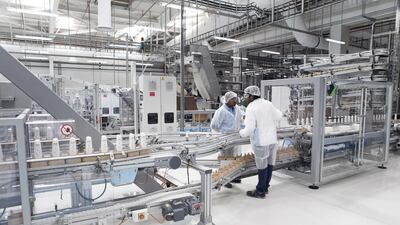Non-oil business activity in the UAE grew in October, with enterprises reporting a surge in inventories ahead of an anticipated uptick in demand, even as cost burdens continue to rise.
The UAE Purchasing Managers’ Index (PMI), sponsored by Emirates NBD and produced by research firm IHS Markit, rose to 55.9 in October from 55.1 in September, and ahead of the historical series average of 54.6. A score of 50 or indicates growth in the country’s non-oil economy, while a figure below 50 indicates a contraction.
Emirates NBD attributed the higher score to rising output growth, linked to strong underlying demand in the non-oil economy, with companies reporting a sharp increase in new business during the month.
October also saw UAE businesses notch up a record expansion in stocks of purchases, in anticipation of higher demand, as business confidence hit a five-month high.
Such new business continues to come at a cost though; firms are continuing to discount selling prices to shore up demand in a deflationary environment, even as input costs rose for the fifth consecutive month.
The Institute of International Finance (IIF) this month forecast the UAE’s consumer price index will rise by just 1.6 per cent this year, down from 1.8 per cent last year.
“The increase in the UAE’s headline index in October reflects faster output growth and a sharp increase in inventories, as firms anticipate stronger demand in the coming weeks,” said Khatija Haque, head of MENA Research at Emirates NBD.
“However, the survey showed that firms continued to discount selling prices in order to support demand, and the employment growth remains modest.”
__________________
Read more:
UAE sees strongest third quarter of non-oil activity in two years
UAE central bank reduces liquidity as signs of economic recovery increase
__________________
In spite of rising cost pressures, businesses cut their charges for the second month in a row, as competition for new business intensifies. The rate of cost reduction was the fastest since March 2010, Emirates NBD noted.
The UAE’s non-oil growth is forecast to rise to 3 per cent in 2017 and 3.5 per cent in 2018, thanks to an easing of fiscal consolidation and an improvement in global trade, the IIF forecasts.
The Washington-based institute noted that the UAE has the financial buffers required to ease the pace of fiscal adjustment to reduce the impact on overall economic growth.
Non-oil business activity also rose in Saudi Arabia during October, even as higher business costs obliged a number of firms to increase prices.
Emirates NBD’s Saudi PMI score rose to 55.6 in October from 55.5 in September, on the back of rising output and new orders.
Business confidence rose in the kingdom during the month, with firms reporting stocks of purchases rising ahead of an anticipated further improvement in economic conditions.
“The headline PMI index for Saudi Arabia has been broadly stable for the last four months, at a level which suggests solid growth in the non-oil sector,” said Ms Haque. “Encouragingly, firms were much more optimistic in October than they were in September, which bodes well for growth in the final quarter of this year.”
Saudi Arabia's non-oil growth is forecast to rise to 1.7 per cent in 2017 from 0.2 per cent last year, according to forecasts by the IMF.

